Rental unit overrun by maggots, mould and feces after city program fails landlord
CBC News
By Ashley Burke
25 October 2017
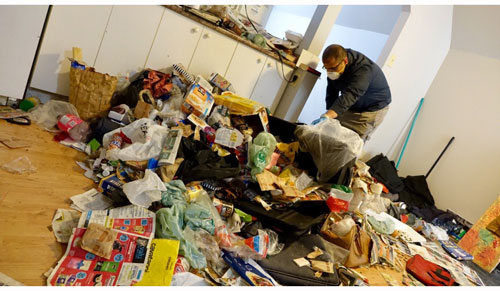
An Ottawa
landlord is facing thousands of dollars in damages after his unit was
trashed by a tenant. He says the City of Ottawa covered his rent so
that a chronically homeless man could get off the streets and have a
permanent place to live, but the arrangement went horribly wrong.
(Ashley Burke/CBC News)
Nitin Mehra thought he was doing a good deed.
The Ottawa man, 32, agreed to join
a city-funded program that matches private landlords with homeless
people who need a permanent place to live.
Seven months later, his unit is
trashed and crawling with maggots. When you walk in the door, you're
hit with the stench of rotting food and feces. The unit's buzzing with
dozens of flies, covered in half-eaten perishables and littered in
piles of knee-deep garbage.
'It's a botched program.'
- Nitin Mehra, Ottawa landlord
"It's a botched program," says Mehra. "The city's heart was in the right place, but they just did not execute it well at all."
Mehra says the program was supposed to provide tenant support services,
which include counselling and weekly visits. None of that happened,
says Mehra. He faces thousands of dollars in damages and has evicted
the tenant, who is now homeless again.
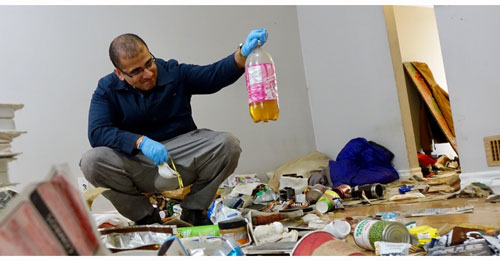
Mehra holds up
a bottle that appears to be filled with urine after his Ottawa duplex
was trashed by a homeless man taking part in a city-funded program.
(Ashley Burke/CBC News)
'I had a lot of assurance given to me'
Three months after he first reached out for answers, Mehra says the
city is finally working with him to resolve the situation, but it has
been a long road.
Mehra bought the Vanier duplex when he was 24 years old. He calls it
the "cutest apartment," where he lived for several years, before buying
another home and turning the duplex into rental units.
Last spring, he bought all new appliances and posted a Kijiji ad
offering the one-bedroom apartment for rent. Within a couple of weeks,
Mehra says, a Salvation Army worker in Ottawa answered his ad asking
him to join a "city-endorsed program" that helps get people off the
streets.
'I was proud of what I was doing'
- Nitin Mehra, Landlord
The Landlord Partnership Program (LPP), a city and Salvation Army
initiative, signs up landlords with vacant units for rent. Then, the
City of Ottawa's Housing First program connects people living on the
streets or in shelters with those landlords, according to the city's
website. From there, the tenant is matched with one of 11 outside
agencies that assign a case manager to provide support services to the
tenant.
Mehra says the worker promised that a housing casemanager would make
weekly home visits, as well as offer cleaning and support services. In
turn, the city would pay the rent.
If anything were to go wrong, he says he was told, his costs would be covered.
"I was proud of what I was doing. I had a lot of assurance given to me."
Mehra even agreed to lower the rent.
The program matched Mehra with a chronically homeless man who signed a
lease and received the keys in April. Mehra didn't sign any other
documents with the organizations involved.
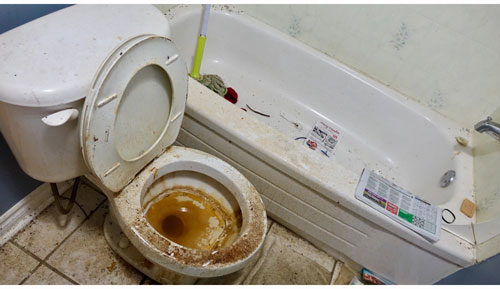
'The washroom
is probably by far the worst thing,' said Mehra. 'Flies are the worst
in here. They've inhabited every corner and are dead all over the tub.
The toilet is just shades of brown. That's human excrement, urine,
vomit. It seems to have splattered all over.' (Ashley Burke/CBC News)
'It's a joke. It's a farce'
It wasn't until July that Mehra suddenly learned something was wrong.
An inspector assessing his property for a mortgage renewal reported a
dramatic drop in his home's value.
"The appraiser asked if it had been a drug den," says Mehra.
Mehra immediately called his tenant's caseworker, who is with the
Canadian Mental Health Association (CMHA). He believed the caseworker
had been visiting his tenant regularly. The caseworker, says Mehra,
told him he had never been inside the unit or even met with the tenant.
"The caseworker's response ... was that, 'I have a big workload. What can I do?'" says Mehra.
Mehra says the caseworker dropped off a bucket and mop for the tenant. Today, it's still sitting on the porch untouched.
"It's a joke," says Mehra. "It's a farce. A mop and a bucket for what's in that unit."
'The smell hits you'
When Mehra finally got permission to enter the unit, he was in disbelief.
"There was feces outside," said Mehra. "The smell hits you almost immediately. The flies are just abundant."
When he took CBC News on a tour of the unit, the crew had to wear masks because of the smell.
In the bedroom, maggots are crawling on the ceiling. In the kitchen,
there's a waist-deep pile of decomposing food, newspapers and old
luggage. The fridge and microwave are also infested with maggots.
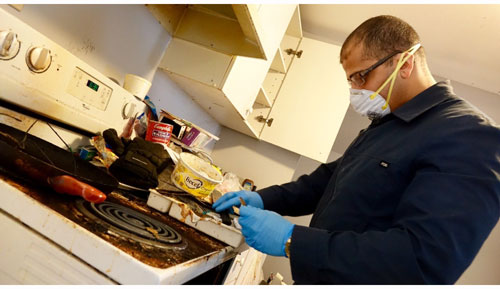
'This is a full
on fire hazard,' said Mehra about the blackened stove. 'This is all fat
here that's accumulated. This is ready to light up anytime.' (Ashley
Burke/CBC News)
'It's heartbreaking. This keeps me up at night'
The stove, which was new when the tenant moved in, is now black with burnt fat and oil.
Mehra calls it a fire hazard and worries about his other tenants — a young couple, living in the lower unit.
"It's heartbreaking," says Mehra. "This keeps me up at night. I genuinely lose sleep that I own this property."
'The city did not keep up their end of the bargain at all.'
- Nitin Mehra, landlord
A contractor quoted Mehra more than $3,500 to clean up the unit.
Repairs could cost even more. There are concerns about mould growing on
the walls. Mehra says he will also have to buy new appliances.
"It's disgusting in every possible way. It's physically disgusting. It's emotionally disgusting."
Citing health and safety issues, Mehra asked the homeless man to leave the unit and he changed the locks.
"Awful, shameful, embarrassed," says Mehra. "I kept up with my end of
the bargain. I gave a safe, clean place to live. The city did not keep
their end of the bargain at all. Now somebody's on the street and I'm
embarrassed."

CBC News wore
protective gear while touring the damaged unit. Knee-deep trash is
piled up in the kitchen. It's a mix of half-eaten food that's rotting
away, old newspapers and luggage. (Ashley Burke/CBC News)
Who is in charge?
Mehra is seeking answers for what went wrong and who is responsible. It has proved to be a complicated process.
The Salvation Army, the group that first called Mehra, had promised his
tenant and unit would be visited regularly by a caseworker. He was also
told a cleaning service would be provided. But when CBC News contacted
the Salvation Army, it said it's only responsible for finding
participants for the LPP. What happens after that is up to other city
partners, says Glenn van Gulik, a public relations director for the
Salvation Army's eastern region.
Van Gulik declined to answer CBC's questions about the promises one of its workers allegedly made to Mehra about the LPP.
"To be clear, the Salvation Army is not entering into an agreement with
anyone," says van Gulik. "The caseworker becomes the person responsible
to make sure the supports are provided."
The Canadian Mental Health Association provided the caseworker for Mehra's tenant.
The executive director of the CMHA's Ottawa branch, Tim Simboli, says
he cannot comment specifically about the case due to privacy concerns,
but did talk about the Housing First program.

'The maggots
were flowing from that milk jug,' said Mehra. 'We did have the maggots
removed so they don't make their way into the pipes.' (Ashley Burke/CBC
News)
'We're not reporting back to the landlord'
Simboli says caseworkers try to meet with Housing First tenants weekly
— if they are co-operating — but there's no guarantee it will be at
home.
"A mandatory visit to the home to check out the shape of the home, that
would never be one of our responsibilities," says Simboli.
"We're not reporting back to the landlord, saying this is good, or bad
or indifferent. We can't do that. We're a health-care provider. Our
privacy rules are very strict and dictated by the province."
That conflicts with a Salvation Army brochure about the program that
states: "The Housing Case Managers conduct a minimum of one home visit
per week," it reads.
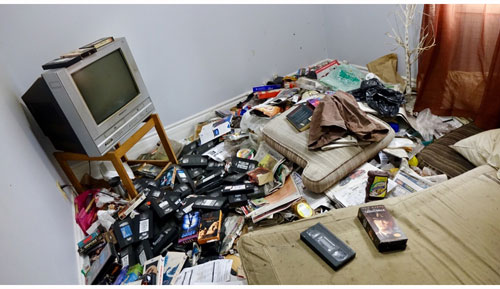
VHS tapes, rotting food and garbage cover the bedroom's floor. Maggots are crawling on the ceiling. (Ashley Burke/CBC News)
Tenant to blame, says CMHA
When asked who is accountable when a landlord's home is trashed by a
Housing First tenant, Simboli says the tenant should be held
responsible.
'Just because you're anxious or depressed or schizophrenic ... doesn't mean you shouldn't be held responsible'
- Tim Simboli, Executive Director, Canadian Mental Health Association Ottawa Branch
"Just because you're anxious, or
depressed or schizophrenic ... doesn't mean you shouldn't be held
responsible if you make an adult decision to do something wrong or are
neglectful," says Simboli. "It's not that kind of program."
Mehra says it's unfair to put the onus on an unstable tenant.
"It's as if you took a small child
and let them run free. This was putting an individual who needs help in
a space and not offering them any help ... locking the door and hoping
for the best. That's all this was."
Simboli calls the Housing First program a success overall.
"I think this is the best program we've got to offer," said Simboli. "Is it perfect? Absolutely not."
'Housing first' model pitched as alternative to Vanier homeless shelter
He says there are a "huge number" of homeless people in need of housing and not enough capacity.
"We have half the casemanagers in
this region that we should have," he says. "We have 10,000 people
waiting for homes. We need to get serious about dealing with people
with mental illness and people who are homeless and we need to start
backing it up."
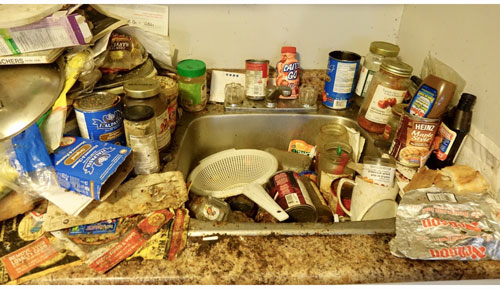
The
sink is brimming with empty cans of food and trash. Nearby mould was
spotted on the wall causing additional concerns to Mehra. (Ashley
Burke/CBC News)
City of Ottawa short on answers
The Housing First program is
co-ordinated by the City of Ottawa, yet no one from the city would
explain to CBC News what went wrong in Mehra's case.
After repeated calls by the CBC, the city launched an investigation.
"Since this situation has come to
our attention, we have reached out to the landlord to resolve the
issue," wrote Shelley VanBuskirk, the city's director of community and
social services, in a statement to CBC News. "Landlords are an
important part of our Housing First program and integral to its
success."
Mehra says a city worker visited his unit this week and told him to submit receipts for the damage.
He's still worried the program is soliciting landlords with false guarantees.
"They've totally misrepresented themselves," said Mehra.
Mehra says he never would have agreed to take part in the Housing First program if he had known the risks.

Mehra
is warning other landlords taking part in the Housing First program to
ask the City of Ottawa to co-sign the lease. His lease was just between
himself and the homeless man. (Ashley Burke/CBC News)
top contents
chapter previous next








